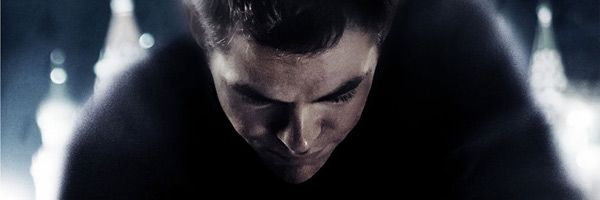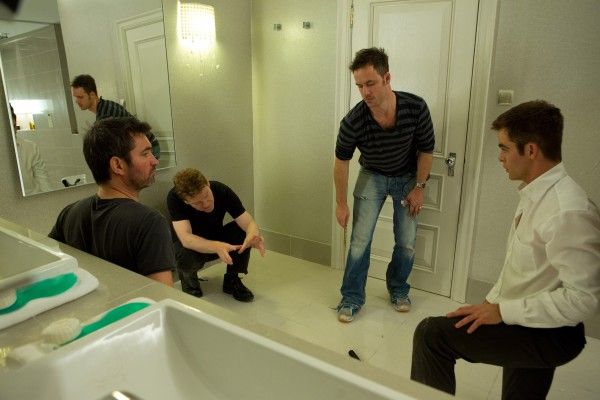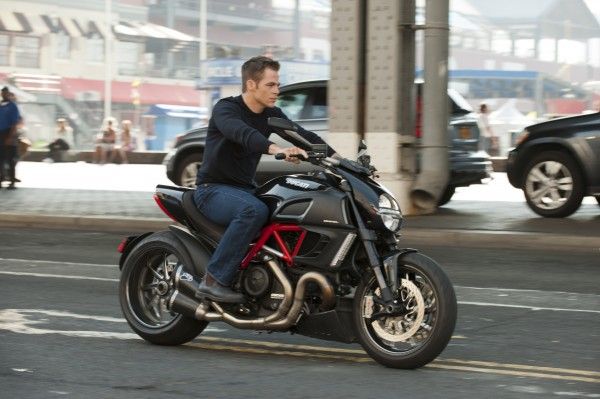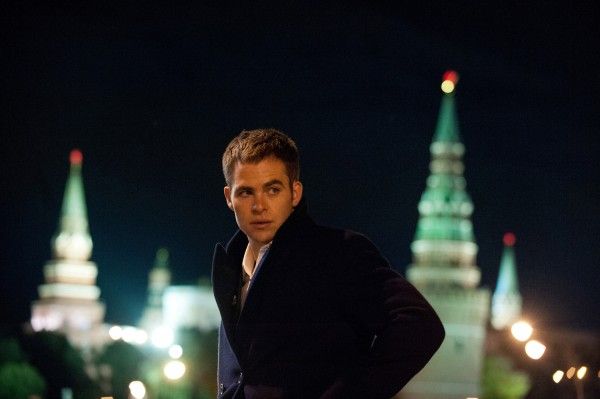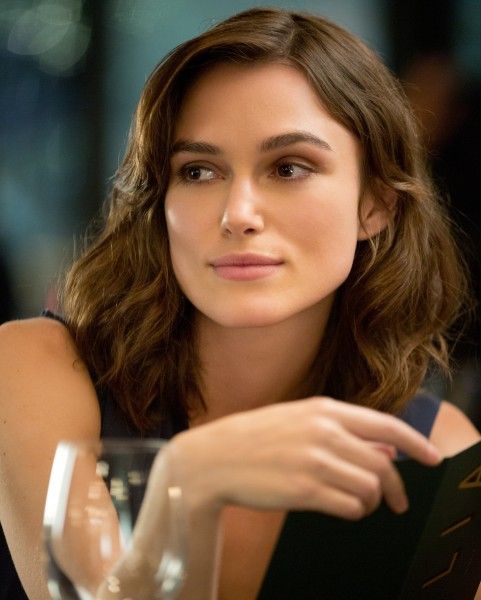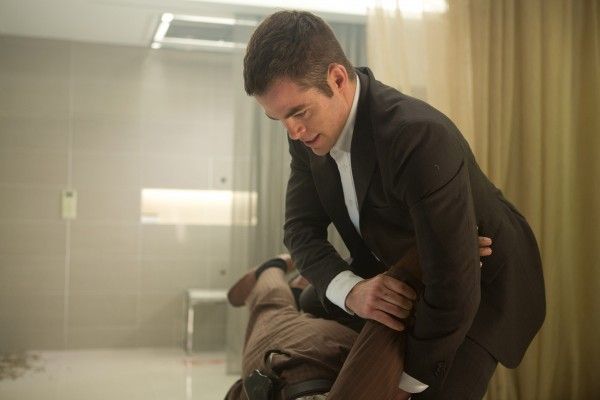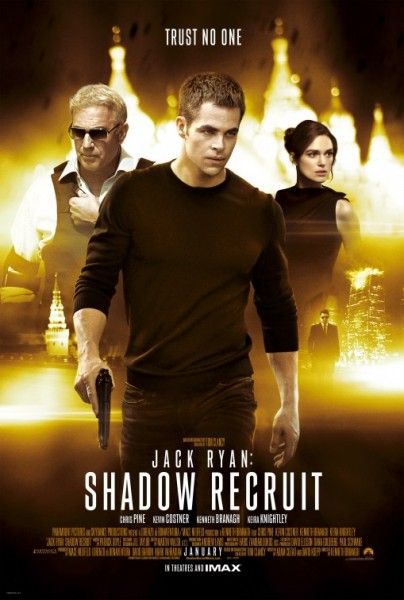With the popularity of the previous Jack Ryan films, you would have thought making another movie featuring author Tom Clancy’s famous protagonist would have been easy. But according to producer Mace Neufeld, he's "been trying to restart it for nine years." He explained that "with executive changes and having really run out of books that we could do, we finally—what triggered it was getting a green light with Kenneth (Branagh)."
During a group interview on the set of Jack Ryan: Shadow Recruit when the production was filming in London, Neufeld and producer David Barron talked about working with Branagh, the various drafts of the screenplay, why they chose Chris Pine, how they got involved with the property, how Steve Zailian spent a year writing a Jack Ryan movie for Harrison Ford but they couldn't get it to work, and so much more. If you're interested in the behind-the-scenes of how a movie gets made, it's a great read. Hit the jump to check it out.
Before going any further, if you haven't watched the Jack Ryan trailer, I'd watch that first:
Question: How did it come about that Kenneth Branagh would play a role as well as direct, did that happen later on?
DAVID BARRON: Truthfully, he always had it in mind. From the moment he joined the film, he always had it in mind, to play that role. The role really appealed to him. He's an actor, he loves acting. He loves directing, but he loves acting too.
I think what he was saying is it's harder doing both.
BARRON: It's harder, it's much harder. Doing either job is hard enough, but doing both together is really very difficult. But he enjoys doing both. And he felt he could play that party very well. And we felt he could play that part very well, so we didn't try to dissuade him.
MACE NEUFELD: And we got him at the right price.
Why bring back Jack Ryan now?
NEUFELD: Why not?
BARRON: Absolutely why not? It's a very contemporary setting for this story. He's a very contemporary character. You haven't seen him for a while. Whether you know Jack Ryan or you don't know Jack Ryan, he's a compelling person to spend time with.
NEUFELD: Well, we have a great script.
BARRON: We do have a great script.
What made you want to restart the franchise rather than continue it on?
NEUFELD: I've been trying to restart it for nine years. With executive changes and having really run out of books that we could do, we finally—what triggered it was getting a green light with Kenneth. I had only talked to him years ago when I called him about directing a film, after he'd done that thriller Dead Again, and we had lunch, and he had read the script and liked it, had some suggestions, but more than that, he had gone beyond the call of duty and read every Tom Clancy book. And that's a lot of pages. And he'd seen all the movies, and was totally prepared and very enthusiastic. The idea of shooting it in London came from Kenneth and David. Because we had been planning on either Montreal or Toronto, with some plate units in New York and plate units in Moscow. And when the idea of London came up, we immediately said, "Oh my God, it's so expensive just to take a taxi cab or even have a lunch here." But then David and Kenneth came to Paramount, and they had done a location survey, and a beautiful screen presentation, and a book showing these wonderful Moscow locations all in London.
BARRON: Having said that, we did shoot in Moscow briefly, and in New York, slightly less briefly. There are really distinct flavors of both the cities that the story is set in, to ground it in reality.
Was it always your plan to reset it in contemporary times?
NEUFELD: Yes. With the exception of Red October, the first one, all the Clancy movies were set in contemporary times. As you know, this has a release date of next Christmas, but we have a story—which I won't reveal to you—which will not be affected. As a matter of fact, it may be even more contemporary a year from now than it is today.
BARRON: It is. It's a very real, central premise to the story. When you do get to know what that central premise is, when you think back, there's been something in the news quite recently where two international superpowers where somebody contemplated the very thing that's happening in our story. It's very real, very contemporary, and a lot of fun.
You started developing this nine years ago, how hard has it been to keep it contemporary? Has the idea evolved a lot?
NEUFELD: Different ideas.
BARRON: The idea we have now is a further development of the idea that was in place when we became involved. I haven't read all the previous drafts, but you've had many iterations.
NEUFELD: We did.
BARRON: Set in many different places, with many different things happening. Some of which have stayed the course, and many others haven’t.
NEUFELD: At one point were developing a Jack Ryan with Harrison [Ford]. Steve Zailian writing on it. We spent a year and half, but we just couldn't nail it. Everybody had to leave to go to work.
BARRON: Coming from the outside and not being involved in all the other development, having Chris Pine as Jack Ryan really furthered the advance of this particular film, and hopefully others to follow. He's a very strong contemporary hero. He's good clean cut, good looking, the camera likes him, and he's an easy hero to put at the center of a film like this, and hopefully a series of films like this.
NEUFELD: Very good actor. I don't know if you've seen him on stage, but I saw him in The Lieutenant of Inishmore and Farragut North before I'd seen him on screen. He's the real thing, and not hard to look at, as they say.
Can you speak about where this film takes place in relation to the furtherment of the series that you have in mind?
BARRON: We haven't discussed what comes after this yet. Kenneth and I only joined a relatively short time ago and it came to fruition very quickly. Our focus is getting this film to the place it needs to be. Getting it shot and finished and hopefully making a film that will make everyone want us to make more films. But we haven't actually discussed yet how it would develop and where it would go from here, but the scope is enormous.
It's a mistake to think that Chris Pine becomes the Harrison Ford version of Jack Ryan?
BARRON: Chris Pine is Chris Pine's version of Jack Ryan. He's the contemporary Jack Ryan. The new Jack Ryan. And hopefully he'll be Jack Ryan for quite a while to come.
How difficult is it to land someone for a three or four picture contract?
BARRON: It's always challenging. It doesn't matter what the film is and who the cast are, unless they're complete unknowns who feel that it would be such an enormous break that they couldn't possibly say no. It's a challenge, cause nobody knows what the next three, four, five years will bring for them. On the one hand, you definitely want to know you're doing three more, or four more, or two more—whatever it might be—because the continuity is very nice. The security is very nice. The chance to develop a character is very nice. But at the same time there's that sneaking suspicion that you might be tying yourself into a knot that means you're not available for something else that might come along that is suddenly irresistible. It's never easy, but it's always possible.
How was the title Jack Ryan decided upon?
NEUFELD: It hasn't been decided upon. We like it.
BARRON: It's punchy and easy to remember. Easy to say, easy to remember. But also this film is not based on a preexisting book. So it's easy to come up with something that's not a book title.
Is there any draw to revisiting Red October in a contemporary setting?
NEUFELD: No discussion at all.
BARRON: The focus has been very much on getting a script to the point where we all felt confident that it's a film we should make. And then going ahead and making, and delivering it to a standard that will make everybody happy. We hope.
NEUFELD: Remember, we're talking about a release date that's a year from this December. But we won't know, we think we're making a really good movie, but we won't know how successful it is till 2014. So a lot can happen between now and then.
BARRON: We will finish the film considerably in advance of the release date. So I'm sure that some discussion will take place between the finishing and the opening as to whether or not we move forward.
Are you guys associated with Without Remorse, the Jack Clark story?
BARRON: We're completely independent.
Is there a plan for these films to collide?
BARRON: Who knows? Until we know whether a) that their film gets made, and b) when both films have been made and the releases are successful enough to warrant further development, which might or might not include cross-pollination.
We've never really seen something like that.
BARRON: No, it's true. But I'm sure there's a great opportunity there. If we do make two successful films and end up with characters that people want to further the journey with, then I'm sure there's great opportunity and hopefully we'll be around to be involved in it.
Can you tell us a little bit about what you're shooting today and why we're here?
BARRON: Most people think of Moscow, or Russia, as being St. Petersburg and classic imperial architecture, which there is quite a lot of in Moscow, but there's also a brand new financial center, which makes it not generic, but not the traditional Russian architecture you'd expect to see and it is something you can see in many place throughout the world. These big trading floors all have the same sort of infrastructure and they're all building new buildings. There's a big, well biggish, new financial center in Moscow that's still under construction, and it's very similar to what we have here.
NEUFELD: A Russian actress, Lana, who's playing Ketchya in the film, she said, when she came here for the first time today, "Wow, this could be Moscow." Which is a great validation of our location choice.
You guy are shooting on film. Was there a big debate about film vs digital?
BARRON: Yes there was. We're actually using both. About 20% digital and 80% film, mixing the two. Because Haris Zambarloukos, our DP, is a great lover of film, and he doesn't think there's anything you can do digitally that you can't do with film. When we shot in Moscow, New York and Liverpool, Moscow and Liverpool in particular were a lot of night shooting, and a lot of cars driving through streets. And Haris contests, and I've never actually put him to the test so I have to believe him, though I can't vouch for it myself, is you can go and shoot pretty much available light in a city setting at night on film, if you use the high speed stocks, but what you get with a digital camera, what we used, the Red, is you're able to see on the monitor what you're shooting with film. With film, by the time you've used a video tap, that splits the light going to the film playing and to the eye piece and the monitor, if it's low light level, you can't really see if it's in focus, if you do an extended cam shot you have no idea, really, whether it's in focus. And you're going back to the old pre-video days of having to trust in your technicians and you'll see tomorrow if it's in focus or not.
So with the Red camera, it was quick and portable, and you can record on high quality cards, rather than have the whole big system that comes with the Alexa Raw.
NEUFELD: You don't have to wait for the call from the lab saying "we had a problem yesterday." We used very few lights in Liverpool. The natural lighting looked great.
So all the filming that you did in New York City, Moscow, Liverpool, was done with the Red?
BARRON: Yes.
And all the stuff here in London…
NEUFELD: Film.
So what other locations are you shooting at?
BARRON: Just London. A fair amount of studio. We used stages at Leavesden. I've been back home to the newly rebuilt Leavesden, which is very nice, familiar but unfamiliar in its new form. And we've got the stages at Pinewood.
Is the stage stuff completely done?
BARRON: We go back on Wednesday and into Pinewood the week after that.
Mace, you have a long history with the character Jack Ryan, how did that begin?
NEUFELD: It began when I optioned The Hunt for Red October in 1985.
What drew you to that?
NEUFELD: The book! It had been on my night table for about a month. A young development executive who was working for me had found it at the Dallas Book Fair. It was published by the Naval Institute Press, it was the first book of fiction they had published. And he said, you have to read this. And I said, "OK," and there it was, and then one evening I picked it up and five hours later I put it down and said, "we have to option this." At that time it was not a best seller yet, and Tom Clancy was not a full-time author. He had a very successful insurance business. But he had a lot of clients who were civil servants, who were the CIA, who were the Navy, so he knew a lot. And I thought this was a terrific story. Men under pressure in confined spaces always makes for good drama.
BARRON: Sounds like being home.
Kevin was telling us that he was offered Red October and couldn't do it. What do you remember about that?
NEUFELD: Well I had done No Way Out with Kevin. And I had optioned the book, and I don't remember the dates, but I called JJ Harris, who was, and still is, Kevin's agent. And I got Kevin on the phone, and he was shooting a film in Mexico, and I asked him if he wanted to play Jack Ryan. And he said he was really occupied with trying to develop another script, a western. And I said, "Well, do you have financing for it?" He said, "No, but I think some people will come." And I said, "Well, I'll help you with the financing." And he said, "Thank you, but I don't think I'll need that." And that was Dances With Wolves. So he made the right decision. And then Red October became a bestseller, because it was described at that point in Time Magazine as being President Reagan's favorite yarn. So we took it from there.
In my opinion, the best transition for subtitles is in Red October, when you zoom in on the mouth and all of the sudden they're talking English, is there a chance you'll do that in this film?
NEUFELD: You have to discuss that with Kenneth. But actually, it was done before us in a film called The Man in the Glass Booth which was about the trial of Eichman in Israel. We used the device again in Clear and Present Danger when Escobar was hitting a baseball and talking in Spanish, and he hit the ball and you came back and he was talking in English.
What kind of questions has Chris been asking you, as someone who's been involved with Jack Ryan the longest? Are you really just saying figure it out yourself?
NEUFELD: No, go with God.
For more from my Jack Ryan: Shadow Recruit set visit:
- 40 Things to Know About JACK RYAN: SHADOW RECRUIT From Our Set Visit; Plus Video Blog Recap
- Chris Pine Talks Drawing from the Previous Films, Working with Kenneth Branagh, and More on the Set of JACK RYAN: SHADOW RECRUIT
- Kevin Costner Talks Turning Down HUNT FOR RED OCTOBER, His Career and Directorial Process, TV, and More on the Set of JACK RYAN: SHADOW RECRUIT
- Director Kenneth Branagh Talks Setting the Film Apart from Other Action-Thrillers, Playing the Villain, and More on the Set of JACK RYAN: SHADOW RECRUIT
- Producer Lorenzo di Bonaventura Talks the Challenge of Rebooting the Franchise, Casting Chris Pine, and More on the Set of JACK RYAN: SHADOW RECRUIT

